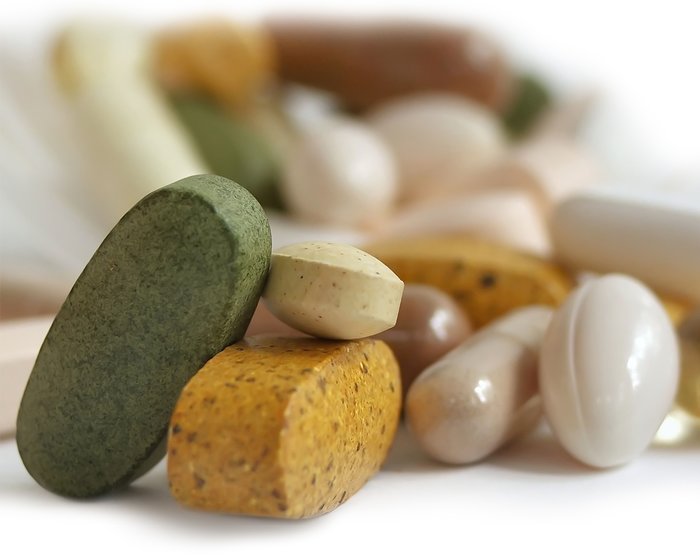Aging has its advantages: clearer priorities, a wiser perspective, higher levels of happiness, and less concern over what other people think. And let's not forget the senior discounts!
Unfortunately, the physiological changes that take place in the body aren't so fun. Bones get weaker, joints become painful and stiff, reaction times start to slow down, cognitive function declines, and the risk of heart disease increases. We even start to shrink a little, thanks to compression of the discs in the spine.
The extent of these changes is largely dependent on the activity and nutritional choices made earlier in life. However, resistance training and a few well-chosen nutritional supplements can drastically slow down, if not stall, some of the physiological decline associated with aging.

Just as importantly, certain supplements may enhance cognitive function, reducing the risk of dementia and improving memory. Improved physical and mental health can lead to a greater level of independence and ability to perform daily activities.
No pill or powder can completely reverse the aging process or replace a properly balanced diet and a solid training program, but the nutritional supplements listed below can help you or a loved one fill in the gaps to stay in tip-top shape.
Give these recommendations a try, or share them with someone you care about!
Supplements For Maintaining Muscle Mass
Don't confuse muscle maintenance with becoming a ripped bodybuilder. Muscle mass might not sound like a priority for seniors, but muscle loss is linked to a surprising number of problems in older adults. An overall reduction in muscle mass and strength, otherwise known as sarcopenia, is thought to be one of the leading causes of functional decline, disability, and the loss of independence and quality of life in older adults.[1]
Fortunately, some of the most effective supplements for muscle are also some of the best researched, and they're all easy to find.
Creatine monohydrate
This supplement powerhouse is essential for older adults. Coupled with an appropriate training program, creatine can have a profound effect on strength, fat-free mass, and functional performance.[2]
Moreover, preliminary evidence suggests that creatine may even increase bone mineral content when combined with resistance training.[3]
For stronger bones and muscles, supplement daily with 5 grams of creatine monohydrate. To boost the effects of creatine, try taking it with conjugated linoleic acid (CLA), as it's been shown to have an additive effect on muscular endurance, strength, and body composition.[4]
Whey Protein/Leucine
Protein intake can lead to increases in muscle mass and strength, particularly when coupled with a resistance-training program. Currently, protein recommendations for older adults fall between 0.45-0.55 grams per pound of body weight per day.[5] However, this requirement may need to be increased for someone who is especially frail or injured.
Although this daily recommended intake is lower than for other age groups, many older adults struggle to eat enough protein to maintain muscle mass. Combining resistance training with whey protein shakes has been shown to increase lean mass in older adults.[6] Many people who resist taking pills enjoy protein shakes, because they feel like a treat and come in a wide variety of delicious flavors.
Because older adults have a reduced capacity for protein synthesis, adding extra leucine could be beneficial. Several studies exist suggesting that supplementation with leucine may normalize or even increase protein synthesis in older populations.[7,8]
Drink two shakes per day with 25-30 grams of whey protein, and add an extra 4-6 grams of leucine to one of the shakes for a boost in protein synthesis.
Supplements for Stronger Bones and Joints
Bone health declines as we age, decreasing our stability and increasing our risk of falls or accidents. Add to that the fact that unhealthy bones can be incredibly brittle, and you have the perfect recipe for a fracture. Joint health is reduced as well, causing stiffness, pain, and a decrease in range of motion.
Resistance training and maintaining an appropriate weight are the best things you can do for your skeleton, but there are a few supplements that may also improve bone and joint health.
Vitamin D
Vitamin D assists the absorption of calcium and is essential for strong, healthy bones. Unfortunately, older adults are particularly susceptible to vitamin-D deficiency as a result of lower exposure to sunlight and a reduced ability to make and absorb vitamin D. This puts them at a greater risk for falls and fractures. Thankfully, a little supplemental vitamin D can have beneficial effects on both balance and strength.[9]
Vitamin D supplementation has also been shown to improve reaction time and functional performance, which can help reduce the risk of accidents and injuries.[10] Improved neuromuscular function not only means a reduced likelihood of falling, but an overall improvement in health and independence for older adults.
Calcium
Calcium is an essential mineral, and is found almost exclusively in your bones. As you age, calcium has a tendency to leave your bones, which increases your risk for osteoporosis, a condition that makes your bones brittle and more prone to breaking. That's why supplementing is so important!
Weight-bearing activities like walking and resistance training will help maintain strong bones, but a calcium supplement will help ensure bones stay strong and healthy. Calcium supplementation may even help to slow down bone loss in post-menopausal women, who are at the highest risk for osteoporosis.[11]
When choosing a calcium supplement, look for calcium carbonate, which has more calcium in it than calcium citrate. Supplementation should be considered by anyone with poor calcium absorption, or for people who have trouble meeting minimum recommendations through their diet.[12]
Glucosamine Sulfate
Glucosamine sulfate is a naturally occurring compound found in the body; it helps make up the fluid that surrounds and cushions joints. As we age, we tend to lose some of that protective fluid, as well as cartilage, causing our bones to rub together. Ouch! Osteoarthritis, or the wearing down of cartilage, affects millions of people worldwide and can make physical activity very painful.
Considerable evidence indicates that long-term glucosamine supplementation may decrease joint pain and joint stiffness, and help maintain cartilage.[13]
It's likely that glucosamine sulfate works to protect cartilage rather than rebuilding it, so it should be used long-term for the prevention rather than treatment of joint pain and stiffness.[14] In other words, don't wait until you have severe joint problems; start supplementing with glucosamine early!
Try out this supplement cocktail for optimal bone and joint support: 1500 milligrams of Glucosamine Sulfate, 1000 milligrams of calcium, and 0.025 milligrams of vitamin D, taken once daily.
Supplements for a Healthy Heart
Cardiovascular disease remains the principal cause of death worldwide, accounting for roughly 20 percent of deaths each year.[15] This has led to considerable interest in finding dietary antioxidants—substances that reduce oxidation and the production of free radicals—to prevent and treat heart disease.
Some heart conditions don't have noticeable symptoms until the condition becomes an emergency, so maintaining a healthy heart is critical, especially later in life.
Coenzyme Q10 (CoQ10)
CoQ10 is one of the most important antioxidants in the body. Levels decrease with age, so supplementing with it may help prevent the onset of cardiovascular disease. While more research is needed in this area, supplementing with 100-200 milligrams of CoQ10 per day may help offset the natural decline in levels and support heart health.
Green Tea
Green tea is full of compounds with antioxidant activity. Tea consumption has been associated with decreased cardiovascular risk, and regular, frequent consumption of green tea—defined as three or more cups daily—potentially lowers the risk of heart attacks.[16]
How does green tea support hearth health? The potent antioxidant properties of polyphenols found in green tea help to reduce free-radical damage to cells and prevent the oxidation of low-density lipoproteins (LDL), inhibiting the production of plaque in the walls of the arteries.
If drinking three or more cups of green tea a day isn't your thing, try supplementing with 300-400 milligrams of green tea extract to see the same benefits.
Supplements to Improve Brain Function
One of the most troubling aspects of aging is the potential reduction of cognitive function. Poor memory, decreased number recall, and dementia are not just inconvenient—they can prevent an aging adult from living as independently as they once did.
However, research has shown that certain antioxidants and anti-inflammatory supplements may reduce the risk of developing cognitive impairment, and in some cases improve symptoms.
Omega-3 fatty acids
We commonly turn to omega-3s for their beneficial effects on whole-body inflammation, but supplementation may also have a beneficial effect on memory and cognitive function. In fact, supplementing with fish oil has been associated with a reduced risk of dementia and greater overall brain health.[17,18] This is particularity true for people who don't consume much omega-3 in their diet, or someone with mild cognitive impairment.[19-21]
While you can get omega-3s directly from your diet by eating at least two servings of fatty fish per week (e.g., halibut, salmon, or tuna) you may find it easier to supplement with 2 grams (2000 milligrams) of fish oil every day.
Choose the brand with the highest levels of EPA and DHA listed in the ingredients.
Creatine
You already know creatine can help maintain muscle, but did you know it can also boost long-term memory? British researchers supplemented older adults with 20 grams of creatine for one week and observed several improvements in number recall, spatial recall, and overall long-term memory.[22]
Vitamin E
Vitamin E serves as a powerful antioxidant in the body, and low levels are associated with higher risk for poor cognitive function, memory loss, and neurological disorders.[23] So it makes sense that adequate vitamin E intake is important for maintaining healthy brain function and reducing the risk of developing Alzheimer's Disease.[24]
The current recommendation for daily intake of vitamin E stands at 15 milligrams per day. In older adults who struggle to maintain a diet rich in nutrients, supplementation with vitamin E may help keep their working memory in prime condition.
References
- Lauretani, F., Russo, C. R., Bandinelli, S., Bartali, B., Cavazzini, C., Di Iorio, A., ... & Ferrucci, L. (2003). Age-associated changes in skeletal muscles and their effect on mobility: an operational diagnosis of sarcopenia. Journal of Applied Physiology, 95(5), 1851-1860.
- Candow, D. G., Zello, G. A., Ling, B., Farthing, J. P., Chilibeck, P. D., McLeod, K., ... & Johnson, S. (2014). Comparison of creatine supplementation before versus after supervised resistance training in healthy older adults. Research in Sports Medicine, 22(1), 61-74.
- Chilibeck, P. D., Chrusci-Ll, M. J., Chadi, K., Davison, K. S., & Burke, D. G. (2005). Creatine monohydrate and resistance training increase bone mineral content and density in older men. The Journal, 9(5).
- Tarnopolsky, M., Zimmer, A., Paikin, J., Safdar, A., Aboud, A., Pearce, E., ... & Doherty, T. (2007). Creatine monohydrate and conjugated linoleic acid improve strength and body composition following resistance exercise in older adults. PLoS One, 2(10), e991.
- Deutz, N. E., Bauer, J. M., Barazzoni, R., Biolo, G., Boirie, Y., Bosy-Westphal, A., ... & Calder, P. C. (2014). Protein intake and exercise for optimal muscle function with aging: recommendations from the ESPEN Expert Group. Clinical Nutrition, 33(6), 929-936.
- Finger, D., Goltz, F. R., Umpierre, D., Meyer, E., Rosa, L. H. T., & Schneider, C. D. (2015). Effects of protein supplementation in older adults undergoing resistance training: a systematic review and meta-analysis. Sports Medicine, 45(2), 245-255.
- Casperson, S. L., Sheffield-Moore, M., Hewlings, S. J., & Paddon-Jones, D. (2012). Leucine supplementation chronically improves muscle protein synthesis in older adults consuming the RDA for protein. Clinical Nutrition, 31(4), 512-519.
- Katsanos, C. S., Kobayashi, H., Sheffield-Moore, M., Aarsland, A., & Wolfe, R. R. (2006). A high proportion of leucine is required for optimal stimulation of the rate of muscle protein synthesis by essential amino acids in the elderly. American Journal of Physiology-Endocrinology And Metabolism, 291(2), E381-E387.
- Muir, S. W., & Montero-Odasso, M. (2011). Effect of Vitamin D Supplementation on Muscle Strength, Gait and Balance in Older Adults: A Systematic Review and Meta-Analysis. Journal of the American Geriatrics Society, 59(12), 2291-2300.
- Dhesi, J. K., Jackson, S. H., Bearne, L. M., Moniz, C., Hurley, M. V., Swift, C. G., & Allain, T. J. (2004). Vitamin D supplementation improves neuromuscular function in older people who fall. Age and Ageing, 33(6), 589-595.
- Reid, I. R., Ames, R. W., Evans, M. C., Gamble, G. D., & Sharpe, S. J. (1993). Effect of calcium supplementation on bone loss in postmenopausal women. New England Journal of Medicine, 328(7), 460-464.
- Tai, V., Leung, W., Grey, A., Reid, I. R., & Bolland, M. J. (2015). Calcium intake and bone mineral density: systematic review and meta-analysis. The BMJ, h4183.
- Reginster, J. Y., Neuprez, A., Lecart, M. P., Sarlet, N., & Bruyere, O. (2012). Role of glucosamine in the treatment for osteoarthritis. Rheumatology International, 32(10), 2959-2967.
- Pavelká, K., Gatterová, J., Olejarová, M., Machacek, S., Giacovelli, G., & Rovati, L. C. (2002). Glucosamine sulfate use and delay of progression of knee osteoarthritis: a 3-year, randomized, placebo-controlled, double-blind study. Archives of Internal Medicine, 162(18), 2113-2123.
- Singh, U., Devaraj, S., & Jialal, I. (2007). Coenzyme Q10 supplementation and heart failure. Nutrition Reviews, 65(6), 286-293.
- Cooper, R., Morré, D. J., & Morré, D. M. (2005). Medicinal benefits of green tea: Part I. Review of noncancer health benefits. Journal of Alternative & Complementary Medicine, 11(3), 521-528.
- Barberger-Gateau, P., Raffaitin, C., Letenneur, L., Berr, C., Tzourio, C., Dartigues, J. F., & Alpérovitch, A. (2007). Dietary patterns and risk of dementia The Three-City cohort study. Neurology, 69(20), 1921-1930.
- Kalmijn, S., Van Boxtel, M. P. J., Ocke, M., Verschuren, W. M. M., Kromhout, D., & Launer, L. J. (2004). Dietary intake of fatty acids and fish in relation to cognitive performance at middle age. Neurology, 62(2), 275-280.
- Cooper, R. E., Tye, C., Kuntsi, J., Vassos, E., & Asherson, P. (2015). Omega-3 polyunsaturated fatty acid supplementation and cognition: A systematic review and meta-analysis. Journal of Psychopharmacology, 0269881115587958.
- Witte, A. V., Kerti, L., Hermannstädter, H. M., Fiebach, J. B., Schreiber, S. J., Schuchardt, J. P., ... & Flöel, A. (2014). Long-chain omega-3 fatty acids improve brain function and structure in older adults. Cerebral Cortex, 24(11), 3059-3068.
- Mazereeuw, G., Lanctot, K. L., Chau, S. A., Swardfager, W., & Herrmann, N. (2012). Effects of omega-3 fatty acids on cognitive performance: a meta-analysis. Neurobiology of Aging, 33(7), 1482-e17.
- McMorris T, Mielcarz G, Harris RC, Swain JP, Howard A., (2007) Creatine supplementation and cognitive performance in elderly individuals. Neuropsychology, Development, and Cognition. Section B, Aging, Neuropsychology and Cognition, 14(5):517-528.
- Ortega, R. M., Requejo, A. M., López-Sobaler, A. M., Andrés, P., Navia, B., Perea, J. M., & Robles, F. (2002). Cognitive function in elderly people is influenced by vitamin E status. The Journal of Nutrition, 132(7), 2065-2068.
- Fata, G. L., Weber, P., & Mohajeri, M. H. (2014). Effects of Vitamin E on Cognitive Performance during Ageing and in Alzheimer's Disease. Nutrients, 6(12), 5453-5472.

